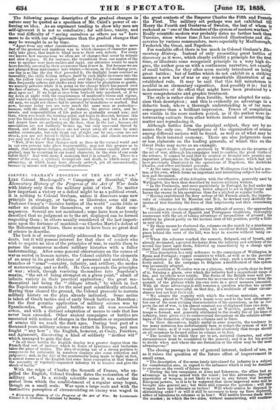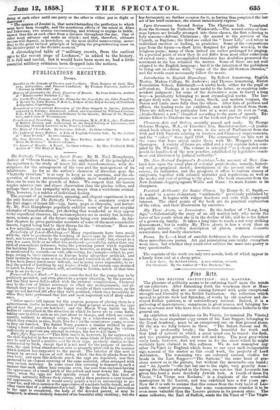COLONEL GRAHAM'S PROGRESS OF THE ART OF WAR. * TTIr-F1 Colonel
MacdougalPs " Campaigns of Hannibal," this Elementary History of the Progress of the Art of War deals With history only from the military point of view. No matter how important a victory or a defeat might be as a political event, it is nothing to Colonel Graham, unless it discovers some new principle in strategy, or tactics, or illustrates some old one. Professor Creasy's " decisive battles of the world " excite little or rather no attention for themselves, or even for their con- sequences. Several are not mentioned ; some have been so loosely described that no judgment as to the art displayed can be formed respecting them ; in others usually considered of the last import- Unce upon the fortunes of mankind—as Charles Martel's defeat of the Mahometans at Tours, there seems to have been no great deal Of science to describe.
The book is of course primarily addressed to the military stu- dents, but it will possess interest for that class of readers who wish to acquire an idea of the principles of war, to enable them to peruse the numerous modem military histories with a fuller understanding. After some general observations on the causes of war as seated in human nature, the Colonel exhibits the elements of an army in its great divisions of personnel and materiel, its branches or " arms"—cavalry, infantry, and artillery, the modes of maneuvering, and so forth. He then expounds the principles of war ; which, though resolving themselves into Napoleon's maxim, "the art of being strongest on a given point," admit of infinite variety in their practical application ; the great ma- thematical law being the " oblique attack," by which in fact the Napoleonic maxim is for the most part scientifically attained. Having thus cleared the ground, the Colonel proceeds to narrate military history on the plan already indicated. Some notice is taken of Greek tactics and of early Greek battles as Marathon ; but the first genuine application of military science was by Epaminondas, whose great battles were all won secundum artem, and with a distinct adaptation of means to ends that has never been exceeded. Other ancient campaigns or battles are recounted with notices of changes in the formation or organization of armies till we reach the dark ages. During best part of a thousand years military science was extinct in Europe, and men fought " any how" ; the English, however, at Crecy, Poictiers,
and Agincourt, discovering a kind of soldierly "mother wit" which managed to gain the day.
"Ia all these battles the English display to a greater degree than the French that sort of instinct which in times of ignorance and barbarism takes the place of tactics. The idea of making use of a strong position to compensate for inferiority in numbers displays also some reflection and judgment; and, in the fact of the gendarmerie being made to fight on foot, it almost seems as if the English had some faint conception at that time of the necessity of regularly-organized infantry fit to receive and give the shock of battle."
With the reign of Charles the Seventh of France, who ex- pelled the English, Colonel Graham dates the restoration of the military art. In a strictly scientific sense it was rather the period from which the establishment of a regular army began, though on a small scale. War upon a large scale and with the instinctive perception of circumventing an enemy was waged in
• Hienseistary History of the Progress of the Art of War. By Lieutenant.. Colonel .1..7. Graham. Published by Bentley.
the great contests of the Emperor Charles the Fifth and Francis the First. The military art perhaps was not exhibited till Henry the Fourth and Gustavus of Sweden, the last of whom is reckoned as ''one of the founders of the system of modern warfare." Really scientific modern war probably dates no farther back than Turenne, since whose time it has received illustrations and dis- coveries by various commanders, more especially by Marlborough, Frederick the Great, and Napoleon.
For readable effect there is too much in Colonel Graham's Ele- mentary History. Instead of only presenting great battles of discovery as it were, which clearly exhibit a principle for the first time, or illustrate some recognized principle in a very high de- gree, the author goes on with a continuous narrative, not exactly of small battles, for they often seem mainly introduced as being great battles; but of battles which do not exhibit in a striking manner a new law of war or any remarkable illustration of an established rule. It may be said that this full minuteness is needful in an elementary exposition. And possibly it is ; but it is destructive of the effect that might have been produced by a more comprehensive and graphic treatment. The style is rather clear than forcible, better adapted for criti- cism than description ; and this is evidently an advantage in a didactic book, where a thorough understanding is of far more consequence than a brilliant impression. Traces of compilation are visible in the more modern period, as if the author were in- terweaving extracts from other writers instead of mastering the matter and reproducing it.
Although battles form the principal subject, they are by no means the only one. Descriptions of the organization of armies among different nations will be found, as well as of what may be called their internal economy. There are also judgments more or less elaborate on the leading generals, of which this on the Great Duke may serve as an example.
"In respect to the influence produced by Wellington on the progress of the art of war, although his campaigns tend to confirm the great truths ef the science, it cannot be said that he created or brought into practice any important principles in the higher branches of the science which had not been previously illustrated in the operations of Napoleon, the Archduke Charles, and other celebrated generals.
" At the same time, it may be claimed for Wellington that he had a sys- tem of his own, which forms an important and interesting subject for reflec- tion and discussion.
"The combination of the defensive with the offensive, generally used by Wellington, has been thus described by various military writers.
"In the Peninsula, and more particularly in Portugal, he had under his command a mass of native troops, better adapied to act as light troops and harass the enemy in his operations than for a pitched or regular battle. " Having experienced the fiery ardour of the French attack, the impetu- osity of columns led by Massena' and Ney, he devised very skilfully the means of first blunting the force of that impetuosity and then overcoming it.
" His plan was to choose positions very difficult of access ; the approaches he covered with clouds of Spanish and Portuguese tirailleurs, thoroughly conversant with the art of taking advantage of inequalities of ground ; his artillery, he placed partly on the tactical crest of the position, partly a little in rear of it.
"By these means he shattered the columns on the march bya murderous fire of artillery and musketry, whilst his excellent British infantry, 100 paces behind the crest of the hill, was kept in reserve without being ex- posed. " When the columns reached the summit, fatigued, out of breath, and already decimated, a general discharge from the infantry and artillery of the second line burst upon them, followed up immediately by a charge upon their half disordered masses.
" This description has only reference to the campaigns of Wellington in Spain and Portugal ; rugged countries to which, as well as to the peculiar characteristics of the troops composing his army, such a system was per- fectly suited. In the campaign in Belgium a modification of this system was necessarily adopted. " The position at Waterloo was on a plateau, with a gentle slope in front of it, forming a glacis, over which the intently, had a magnificent range of fire, and its effects were terrific. The flanks of the British were well pro- tected, and Wellington could observe the movements of the enemy from the summit of the plateau while his own were in a great measure concealed. With all these advantages it still remains a question whether his system would have been successful on that day, if a multitude of other circum- stances had not lent their aid.
" We admire the sagacity with which the various materials, or na- tionalities, placed in Wellington's hands were used to the best advantage; but one of the most striking characteristics of his operations, as far as res- pects the art of war, is his almost constant use of deployed lines two deep. " His successes in the Peninsula, and at Waterloo, gained with the troops so formed, and generally attributed to the deadly fire of his lines of infantry, have given rise to controversial discussions on the relative advan- tages of the formation of troops in columns and in lines.
In these discussions, highly useful in some respects, the tendency in too many instances has unfortunately been to reduce the system of war to absolute rules, as if it were possible to decide absolutely that troops should on all occasions be formed either in column or in line.
" The locality in which they are to act, national character, and other circumstances must be considered by the general ; and it is for his genius to decide when and where the one formation or the other may be the moat advantageous."
The closing passage is one of general interest, indeed of use, as as it raises the question of the future effect of improvement in small arms.
"The description of fire-arms lately introduced for infantry is a subject for consideration also, in regard to the influence which it may be destined to exercise on the result of future wars.
"During the late campaigns at Alma and Inkerman, the allies had an advantage in being armed with the minis ; but this advantage, through superiority of weapon, is not likely to occur in any future war between European powers, as it is to be supposed that these improved arms will be brought into general use ; but there still remains the question : will this weapon have any influence on tactics ? Will whole armies be disposed in skirmishing order ? or will it still be necessary to keep up lines deployed, either of battalions in columns or in line ? Will battles become duels with the musket ; in which the two sides, without manoeuvring, will continue
firing at each other until one party or the other is either put to flight or destroyed
" The opinion of Jomini is, that notwithstanding the perfection to which arras have been brought, and the murderous effects of the mink* at Alma and Inkerman, two armies encountering, and wishing to engage in battle, cannot thus fire at each other from a distance throughout the day. One or other must advance and make an attack ; and that, therefore, ultimate success will depend, as heretefore, on the most skilful manceuvring, accor- ding to the great tactical principle of bringing the preponderating mass on the decisive point at the decisive moment."
A. chronological table of " military events, from the earliest ages to the recent siege of Lucknow," is added to the history. It is full and useful, but it would have been more so, had a little essential military criticism been dropped into the notices.



























 Previous page
Previous page